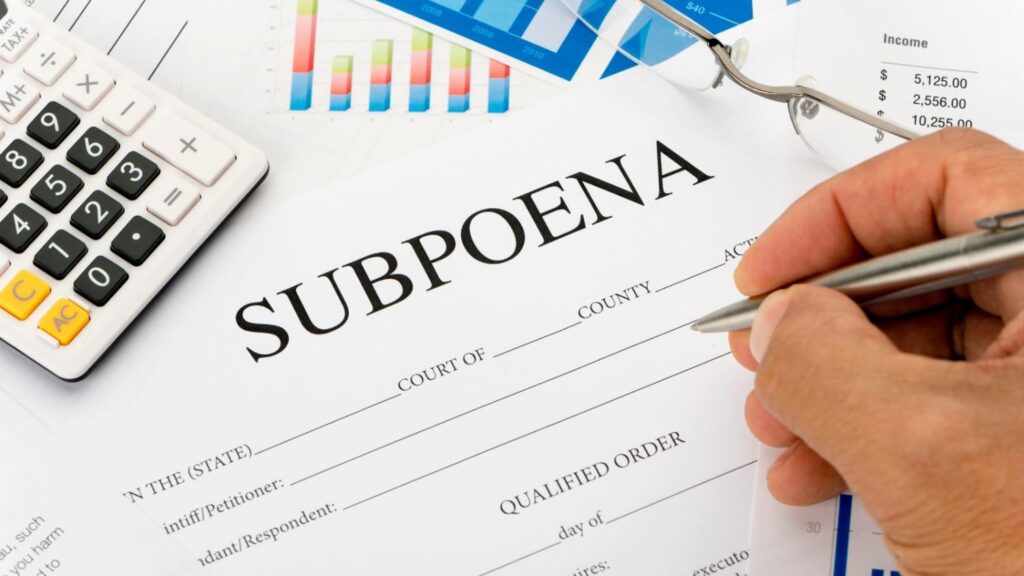
Receiving a third-party subpoena can create a whirlwind of stress and confusion for your business. You might be worried about the legal implications, confidentiality concerns, or even the sheer amount of work required to comply. Navigating this process correctly is crucial to avoid legal pitfalls and protect your business interests. This guide will help you understand how to appropriately respond to third-party subpoenas, covering every step from initial receipt to final submission. We will explore how to manage your response, safeguard sensitive information, and leverage the knowledge of a business attorney to guide you through this legal obligation.
Understanding Third-Party Subpoenas
A third-party subpoena is a legal order requiring someone not a party to a lawsuit to provide information, documents, or testimony relevant to a legal proceeding. These subpoenas can be issued in civil, criminal, or administrative cases and often serve to gather critical evidence. Third-party subpoenas typically come in two forms: a subpoena duces tecum, which demands the production of documents, and a subpoena for testimony. The impact of receiving such a subpoena can be significant, especially if the information requested involves sensitive or proprietary data.
For businesses, receiving a subpoena can be daunting, with the potential for extensive time and resources to be involved in complying with requests. Properly responding to a subpoena is essential to protecting your business’s interests while complying with legal requirements. In this guide, we will explore the necessary steps and strategies to efficiently handle third-party subpoenas, ensuring that your business can navigate this process with confidence and clarity.
Immediate Actions Upon Receiving a Subpoena
When your business receives a subpoena, you must act swiftly and deliberately. Initial steps can significantly affect your ability to respond effectively while safeguarding your interests. Understanding the immediate actions can prevent potential legal issues and set the foundation for a proper response.
Verifying Subpoena Authenticity and Service
When you receive a subpoena, the first step is to verify its authenticity. Ensure the subpoena has been issued by a legitimate court or authorized attorney. Look for official court seals and signatures indicating that the document is genuine. It’s also essential to confirm that the subpoena was served correctly, following the legal protocols in your jurisdiction. This might involve personal delivery by a process server or another legally acceptable method. If the subpoena seems suspicious or improperly served, consult your legal counsel immediately to discuss the appropriate next steps. These verification steps ensure you are responding to a valid legal request, not an error or fraudulent demand.
Identifying Crucial Deadlines
Understanding the deadlines associated with the subpoena is crucial. Typically, the subpoena will specify a date by which you must comply. Carefully note this date and calculate how much time you have to prepare your response. Missing a deadline can lead to legal penalties, including fines or contempt of court charges. Creating a timeline that allows ample time for document collection, review, and submission is essential. Prioritizing tasks based on their urgency and complexity will help ensure that you meet all deadlines without last-minute scrambling. If the deadline is unmanageable, consider negotiating for an extension with the issuing party as soon as possible.
Notifying Key Stakeholders
Once you verify the subpoena’s authenticity and understand the deadlines, notify all relevant stakeholders within your business. This step ensures that everyone involved is aware of the situation and can contribute to an effective response. Immediate notification allows for the proper document review and coordination among team members.
Key stakeholders to notify should include:
- Legal Counsel: Inform them immediately for guidance on legal implications.
- Management Team: Keep leadership updated to align on strategy and resources.
- Compliance Officers: Engage them to ensure adherence to regulatory requirements.
- IT Department: Involve them if electronic data retrieval is necessary.
- Relevant Employees: Notify any staff members whose documents or input may be required.
Clear communication with these stakeholders is essential to developing a cohesive response strategy. By engaging these key players early on, you’ll ensure your response is well-coordinated and thoroughly planned.
Assessing the Subpoena’s Scope and Validity
Once you’ve handled the initial steps, assessing the subpoena’s scope and validity is crucial. This evaluation helps you understand what is being asked and whether you have grounds to challenge any part of the subpoena.
Analyzing Information Requests
Start by examining the information requests outlined in the subpoena. Pay close attention to what documents or data are being demanded and whether they are relevant to the case. Consider the scope of the requests: are they reasonable and specific, or overly broad and burdensome? Clarifying these aspects will guide you in determining your response strategy. Evaluate whether the subpoena requests information beyond what you typically maintain or can readily access. This analysis is crucial to ensuring compliance without unnecessary exposure or expense. If you have questions about the nature of the requests, consulting with your legal counsel can provide clarity and direction.
Identifying Potential Legal Objections
Once you’ve analyzed the requests, consider whether you have any legal grounds to object to the subpoena. Legal objections can be based on several factors, and raising them can protect your business from undue burden or exposure.
Pointers to consider for potential legal objections are the following:
- Relevance: Assess whether the requested information is relevant to the legal case.
- Overbreadth: Determine if the subpoena requests more information than necessary.
- Undue Burden: Evaluate whether compliance would burden your business unreasonably.
- Legal Rights: Consider any legal rights you have that might justify objections. The requested information may be subject to privacy rights, trade secret protection, or be business confidential information that you may not want to disclose.
- Procedural Errors: Identify how the subpoena was issued or served.
If you identify potential objections, document them clearly and consult your attorney to determine the best action. Legal counsel can help draft a formal objection, which is often required to challenge a subpoena legally. In some cases, filing a motion to quash the subpoena might be appropriate, especially if you believe compliance would violate your legal rights or impose an unreasonable burden.
Evaluating Confidentiality and Privilege Issues
When assessing the subpoena’s scope, carefully evaluate any confidentiality and privilege issues that may arise. Determine whether the information requested includes sensitive or proprietary business data that must be protected. Attorney-client privilege, trade secrets, or proprietary business information may be relevant, depending on the nature of the subpoena. Engaging a business litigation attorney can be beneficial in identifying such issues and advising on the appropriate steps to protect privileged information. If any documents are privileged, you’ll need to prepare a privilege log outlining the reason for withholding them. This step is crucial in balancing compliance with the need to protect sensitive business information.
Formulating Your Response Strategy
After assessing the subpoena’s scope and validity, the next step is formulating a comprehensive response strategy. This involves deciding how to respond in a way that protects your business interests while ensuring compliance with legal obligations.
Conducting Internal Information Review
Start by conducting a thorough internal review of the information requested in the subpoena. Identify and gather relevant documents, data, and communications that fall within the scope of the request. Assess the availability of these documents and determine whether they are easily accessible or require additional effort to retrieve. This process helps ensure your response is accurate and complete, minimizing the risk of overlooking critical information. It’s also essential to involve your IT and records management teams, as they can assist in locating electronic data and ensuring its integrity during the review process. A meticulous internal review sets the foundation for a well-organized and comprehensive response.
Choosing Between Compliance, Objection, or Motion to Quash
Once you’ve conducted your internal review, decide whether to comply with the subpoena, object to it, or file a motion to quash it. Each option has implications, and choosing the right path requires careful consideration.
- Compliance: Compliance may be the best option if the subpoena is valid and the requests are reasonable. This involves preparing and submitting the requested documents within the specified timeframe.
- Objection: You can object to the subpoena if it is overly broad, irrelevant, or burdens your business. This involves formally raising your objections with the issuing party or the court.
- Motion to Quash: Filing a motion to quash is appropriate if you believe the subpoena is invalid or infringes upon your legal rights. This legal motion asks the court to nullify the subpoena entirely.
Each option has its own set of risks and benefits. Consulting with your legal counsel is crucial to determining the best approach for your specific situation. They can help you navigate the complexities of the legal process and ensure that your response strategy aligns with your business interests and legal obligations.
Negotiating with the Requesting Party
Negotiation can be a valuable tool in managing a third-party subpoena. Engaging with the requesting party can sometimes lead to a more favorable outcome, such as narrowing the scope of the requests, extending deadlines, or addressing confidentiality concerns. Effective negotiation requires a clear understanding of your business’s position and the legal context of the subpoena. This is where understanding why you need a business attorney becomes essential. A skilled business attorney can facilitate negotiations, advocate for your interests, and help craft solutions that minimize disruption to your operations. By opening lines of communication with the requesting party, you may achieve a resolution that satisfies both legal requirements and your business’s needs.
Preparing and Submitting Your Response
After determining your response strategy, the next step is to prepare and submit your response to the subpoena. This involves compiling the necessary documents, ensuring they are accurate, and presenting them organized.
Drafting a Comprehensive Written Response
A comprehensive written response is critical to your subpoena compliance process. Your written response should clearly outline how you intend to comply with the subpoena, including any documents you plan to provide and any objections or issues you wish to raise. Be precise and direct in your language, avoiding ambiguity. If necessary, the written response lets you communicate your position to the requesting party and the court. It should address all elements of the subpoena and include a clear statement of any legal objections or concerns about confidentiality. Collaborate with your legal counsel to ensure the response is legally sound and aligns with your business’s interests.
Implementing Document Review and Redaction
A thorough document review and redaction process is essential to protecting sensitive information while complying with the subpoena. Review all documents for relevance and accuracy, ensuring they fall within the subpoena’s scope. Carefully examine each document for confidential or privileged information that should not be disclosed. Redact sensitive content, such as personal data, trade secrets, or privileged communications, before submitting documents. Redaction helps safeguard your business’s proprietary information and reduces the risk of inadvertent disclosure. Use software tools to ensure thorough and accurate redaction and document any redactions made for transparency and compliance.
Organizing and Formatting Responsive Materials
Proper organization and formatting of responsive materials are crucial for presenting a precise and professional response to the subpoena. Begin by categorizing documents according to their relevance to each request in the subpoena. This organization aids the requesting party in understanding the information you provide and helps demonstrate your compliance efforts. Ensure that each document is clearly labeled and that any additional notes or context are included where necessary. Consider potential issues related to types of breaches that could arise if documents are not correctly handled, such as data breaches due to poor organization or formatting. Your goal is to present the materials in a manner that minimizes the risk of misinterpretation or oversight. Consult with your legal team to confirm that the final submission meets all legal and procedural requirements, ensuring your response is complete and effective.
Post-Submission Actions and Follow-Up
Submitting your response to the subpoena is not the end of this process. Follow-up actions are essential to ensure ongoing compliance and prepare for future legal developments. These steps will keep you organized and ready for any additional requirements.
Documenting Your Subpoena Response
After submitting your response, it is essential to document all actions taken during the subpoena process thoroughly. Maintain detailed records of all documents submitted, including copies of everything you provided, along with a record of any communications with the requesting party or the court. This documentation serves as a comprehensive trail of your compliance efforts and can be invaluable in case of future disputes or follow-up requests. Additionally, a well-organized record will help your legal team quickly address any questions or issues that may arise. Keep these records secure yet accessible to ensure you can refer to them as needed.
Monitoring for Additional Requests or Clarifications
Once your initial response has been submitted, monitor for additional requests or clarifications from the requesting party or the court. Establish a process for tracking communications and document requests, ensuring you can quickly access and provide any additional information required. Engage your legal team to assist in interpreting new requests and determining the appropriate response.
Preparing for Potential Depositions or Hearings
If the subpoena process involves depositions or hearings, preparing thoroughly is vital. Depositions require careful preparation to ensure you or your representatives provide clear and accurate testimony. Work closely with your legal team to understand the scope of the deposition and the types of questions you might face.
Critical preparation pointers include:
- Consult with a lawyer: Business dispute lawyers can offer insights specific to the legal issues.
- Review relevant documents: Ensure you are familiar with the details of the case and any materials submitted.
- Practice your testimony: Conduct mock depositions with your legal counsel to prepare for questioning.
- Understand legal rights and obligations: Know what you are required to disclose and what can remain confidential.
- Coordinate with your legal team: Discuss strategies and responses for potentially challenging questions.
Your business dispute lawyer will be crucial in navigating these proceedings, offering advice and advocacy to protect your business’s interests. By preparing diligently, you can approach these legal challenges with confidence and clarity.



